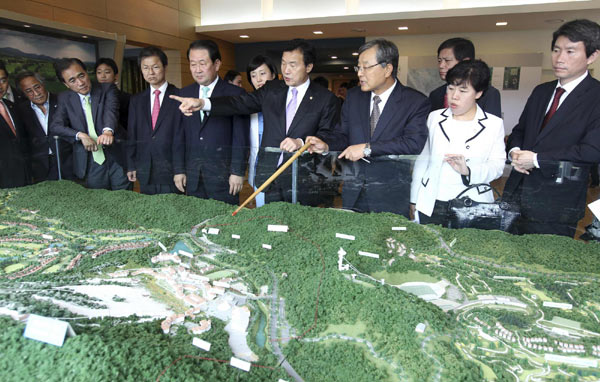ROK opposition leader mulls co-hosting Games with DPRK
 0 Comment(s)
0 Comment(s) Print
Print E-mail
China Daily, July 13, 2011
E-mail
China Daily, July 13, 2011
 |
|
Sohn Hak-kyu (4th R), leader of opposition Democratic Party and other lawmakers of the party look at a model of the venue of Pyeongchang Winter Olympics at Gangwondo Development Corporation in Pyeongchang, about 180 km (112 miles) east of Seoul, July 11, 2011. [Photo/Agencies] |
The Republic of Korea(ROK)'s opposition leader and a strong presidential contender said Monday he will "seriously" consider co-hosting the 2018 Winter Olympics with the Democratic People's Republic of Korea (DPRK).
Last week, the country's alpine city of Pyeongchang won the bid to host the Winter Games, becoming the second Asian city to host the event. The city, some 180 kilometers east of Seoul, trumped Munich and Annecy, France, in its third Olympics bid.
Amid triumphant jubilance, opposition lawmakers are raising what they say a new prospect for peace and reconciliation on the Korean peninsula, which remains divided after a truce that ended hostilities in the 1950-53 Korean War.
"We intend to seriously consider the possibility of both South and North Korea holding the Pyeongchang Winter Olympics," Sohn Hak-kyu, chairman of the main opposition Democratic Party, said at a meeting with senior party leaders held in Pyeongchang.
"The Pyeongchang Olympics should be the Olympics of peace and reunification," Sohn added, pledging he will make efforts to form a joint inter-Korean Olympics team. "Let us dream of a historical turning point in our history of national division."
Sohn is not the first one to float the idea, another key Democrat pitched similar ideas after the ROK's city with a population of 47,000 was awarded the Winter Games.
Chung Dong-young, a member of the party's Supreme Council, said last week that the Democratic Party, after reclaiming power in the 2012 presidential election, should jointly hold the event with Seoul's northern neighbor.
Suspended cross-border tours, another challenge to the icy inter-Korean relations, should also be resumed, Chung, a former unification minister, added. Seoul and Pyongyang sharply differ over the troubled tour projects, put on hold after a shooting death of a ROK's female tourist at a mountain resort north of the border.
Other key Democrats also called for the resumption of food aid to the DPRK as a means of improving inter-Korean ties, despite the apparent reluctance on the part of the Lee administration to dole out food aid to its hostile neighbor.
The remarks made by opposition heavyweights came under media spotlight but also copped some public criticism, with relations between the two Koreas at their lowest over deadly incidents last year.
Seoul's conservative government led by President Lee Myung-bak maintains an ever-harsher stance on Pyongyang, suspending almost all cross-border exchanges, while Pyongyang refuses to admit to or apologize for the fatal incidents.





